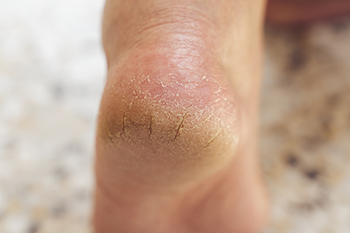
Heel fissures, which are cracks in the skin on your heels, can be more than just a cosmetic concern. Heel fissures often lead to discomfort and may even pose a risk of painful infections and skin damage. Diabetics are particularly susceptible to heel fissures because of the effects of damaged nerves in the feet that hinder natural moisturization. Dry skin is the most common cause associated with heel fissures, but various factors may contribute to their formation. Among them are eczema, athlete's foot, and environmental conditions. Additionally, medical conditions such as hypothyroidism, psoriasis, and rheumatoid arthritis can be factors. Any condition that results in the thickening of tissue or affects sweat production can heighten the risk. To tackle heel fissures, consider applying thick moisturizers twice a day. For more stubborn cases, a podiatrist may prescribe the use of products containing alpha hydroxy acids, salicylic acids, or urea to help shed dead skin cells. Anyone with heel fissures is wise to take this condition seriously. For help, it is suggested that you make an appointment with a podiatrist for an exam and appropriate treatment options.
If the skin on your feet starts to crack, you may want to see a podiatrist to find treatment. If you have any concerns, contact Dr. Larry Cohen from New York City. Our doctor can provide the care you need to keep you pain-free and on your feet.
Cracked Heels
It is important to moisturize your cracked heels in order to prevent pain, bleeding, and infection. The reason cracked heels form is because the skin on the foot is too dry to support the immense pressure placed on them. When the foot expands, the dry skin on the foot begins to split.
Ways to Help Heal Them
- Invest in a good foot cream
- Try Using Petroleum Jelly
- Ease up on Soaps
- Drink Plenty of Water
Ways to Prevent Cracked Heels
- Moisturize After Showering
- Skip a Shower
- Keep Shower Water Lukewarm
- Don’t Scrub Your Feet
If you are unsure how to proceed in treating cracked heels, seek guidance from a podiatrist. Your doctor will help you with any questions or information you may need.
If you have any questions, please feel free to contact our office located in Midtown, Manhattan . We offer the newest diagnostic and treatment technologies for all your foot care needs.







